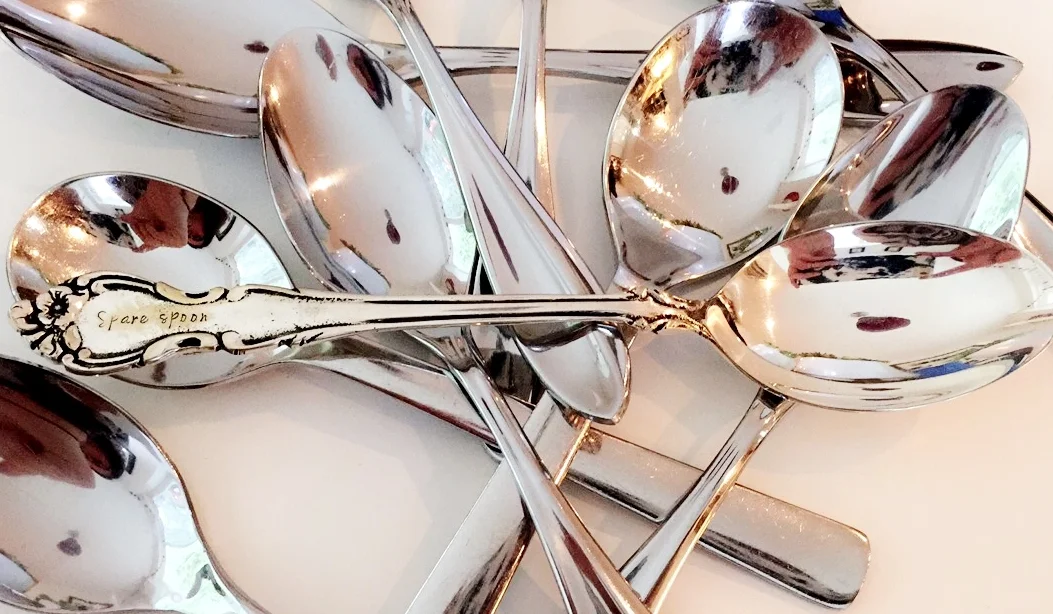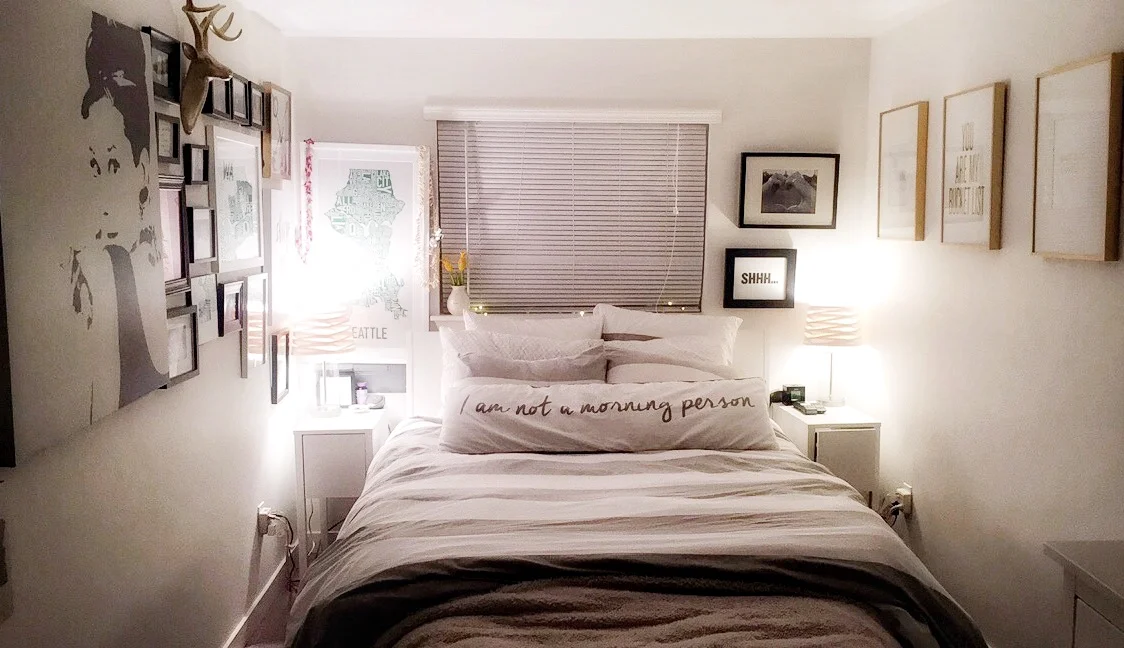what is a spoonie.
The Spoon Theory
I often talk about being a spoonie and I've had people ask me what it is. It is actually something those of us with a chronic illness call The Spoon Theory.
It began when a young woman named Christine Miserandino explained to a friend what it was like to have lupus. They were hanging out at a diner when the friend asked what it was like. Christine gathered all of the spoons from their table and a few more from others, then explained that when you have a chronic illness you only get so many "spoons" per day.
Every tiny thing uses up spoons: getting out of bed, doing the dishes, showering, getting dressed, working, taking your dog out... pretty much everything. When you use up all of your spoons for the day, you can borrow from tomorrow—but you will PAY in "spoons". You only get so many per day. If you do something extra like have a night out on the town, workout, get happy hour with friends, etc. you have to borrow "spoons" or energy from the next day. After a big day you usually spend the next day or two resting and recovering as you are now without enough spoons for the day. We constantly are battling chronic fatigue.
Spoonies suffer from Autoimmune diseases, if you don't know what that is, it is where your immune system attacks healthy cells. Depending on the type, an autoimmune disease can affect one or many different types of body tissue. It can also cause abnormal organ growth and changes in organ function. I have Rheumatoid (RA) and Psoriatic Arthritis (PsA), fibromyalgia, and Psoriasis (Ps). With my RA/PsA my immune system registers my joints as foreign and attacks them. This cause pain, and damage to your joints, but also your organs.
My Personal Journey
I turned 30 last year, but I've been fighting this since I was 19-years-old. I remember the day when my hands started to hurt. I was working as a barista at Starbucks the summer before my Sophomore year of college. I would steam milk and then my hands were in so much pain I couldn't hold onto the pitcher and I would just drop milk all over myself. The fatigue kicked in and I was a mess. I talked to a doctor about it and given my age the first test they did was nerve testing on my hands and wrists thinking I had carpal tunnel syndrome. From personal experience, that was one of the worsts test, they basically electrocute you about 10 times on each hand. It's just cruel. The things we go through to obtain a diagnosis is crazy.
I went to doctor after doctor, specialist after specialist trying to figure out what was wrong with me. It's pretty terrifying when someone like a doctor, who you believe should have all the answers, can't tell you what is wrong with you, why your body is failing you. Over the course of five months, I was tested for carpal tunnel syndrome, Lyme disease, Lupus and so many more. By this point I had moved into my sorority house. As an underclassman I was supposed to be sleeping on the third floor on the sleeping porch, keeping my things in my big sister's room. Well, I could barley make it up the stairs to the second floor so I was given a three man room with one other live-in roommate and then a roommate that just had her clothes in our room. I remember waking up at night and I had kicked my comforter off of me and I was in so much pain I couldn't lift it back up, it felt like it weighed 200lbs. I laid there shivering in tears until my sobs woke my roommate up and she asked what was wrong. I'd never felt so helpless having my friend get out of bed to pull my covers back over me.
After 5 months of not knowing what was going on with my body a doctor put me on prednisone, one of the most magical and worst drugs you could ever be put on. It masks everything. On my worst days when I take it I feel like a normal human who can accomplish normal tasks. But, with that feeling of strength and normalcy comes hot sweats, insomnia, hunger to eat anything and everything in sight, you retain water and the best of all, moon-face. I gained 100+ lbs in the 5 months I was on a steady dose of pred, I'm still struggling to get it off to this day.
But in December of 2005 I finally had a diagnosis, I had both Rheumatoid arthritis due to my high rheumatoid factor, but my symptoms presented like Psoriatic Arthritis. I was referred to a rheumatologist in Eugene, Oregon where I was going to school.
My mom had driven down to Eugene from Portland to go to the appointment with me, and it was probably the most terrifying doctors appointment I've ever been to. I wasn't really sure how you treated rheumatoid arthritis, at the time all I had known was it was a disease old people had. I didn't know I would have to give myself an injection once a week and take chemotherapy. But, there I was, a 19-year-old college sophomore, fresh back to school from winter break sitting with my mom in this drab Rheumatologist's office. This lanky dark haired Russian woman walked in, I could barley understand her beyond her accent, but what I did walk away with from that appointment was that with the medications I would be on I wouldn't be allowed to drink alcohol (I hadn't turned 21 yet so that was my next big milestone birthday) and that I wouldn't be able to have kids, because of the chemo therapy. My jaw was on the floor and I was holding back so many tears. Right after she dropped these bombshells on me, a nurse came in and said "Room 3 is ready for their injection" and still not understanding the disease and treatments, hearing that freaked me out, what kind of a doctor office was this?, I thought. I looked at my mom with tears welling in my eyes and said, I want a second opinion. We didn't have many options for doctors in Eugene, but I knew this wasn't the right fit.
So I decided to look for a Rheumatologist in Portland, Oregon and make the drive every few months to Portland for check-ups. The treatment was the same, but the bedside manner of my new doctor made all the difference. His Physicians Assistant was saint who walked me through everything and was on the phone with me when I gave myself my first solo injection.
Being in college with this disease was hard. My Arthritis derailed my life. There were places I wanted to go, and things I wanted to do, but now I had to think about what can my body handle, how am I going to get my meds? My medication is shipped to me monthly, it is a cold box of injections that have to be stored int he refrigerator. I can't travel abroad for a term because I can't get my medication there and traveling with them is a nightmare, I've done it.College was hard enough as it is, but add a physically debilitating disease, it felt impossible. I struggled to get to my 8 am classes when I first started my methotrexate (chemo therapy) pills because I was so nauseous. I had to retake grammar 101 three times before I got into the Journalism school, everything was that much harder.
Every term I remember having to walk up to my professors and instructors and re-explain this disease I was fighting so hard. Explain to them symptoms I was still trying to understand without crying. It felt like a death sentence. I felt they needed to know where I was on days they didn't see me in class, or why I was always in their office hours catching up. I remember when I told my favorite professor, the look on her face broke me in two, I'll never forget the hug she gave me.
Everyone says "you're too young for this," "You can't be sick," "My [insert older relative] has that it's awful." I've heard them all. There is no cure for this disease, the pain is a well-intentioned weatherman. Rain or shine, I always feel too much. I blame the barometric pressure on the subtle aches I feel when the weather has changed.
I made it through college. A little more weathered than my peers. I became more of an introvert because of my arthritis. I saw so many of my friends go in the opposite direction; they flourished in college, where I became self-conscious from the weight I'd gained from the medication and I was less active because of the pain I was in. I was a 4 year Letterman winner for volleyball in high school and had turned down a scholarship to play.
Post college I moved to Seattle. My first few years getting used to working was hard, the chronic fatigue set in big time. But I was living with four friends in a house so there were people around to help me out with stuff when I needed it. After a year and a half one of my roommates and I moved out into an apartment. It being just the two of us rather than the four in the house, I felt more isolated, my roommate was a social butterfly, and I loved that, she got me out and about more when some days I'd rather stay at home. There were times when I turned down opportunities to go out, I had run out of spoons that day and I started to feel the guilt. I felt friends pulling away because all I ever wanted to do was sit at home and rest.
One day my roommate had left for work already, and I woke up not feeling well but was determined to go into the office. I actually worked in the healthcare field and on accounts focused on RA and PsA. But this day in particular I was flaring bad. I lifted my leg up to get in the shower and cried, it felt like I was lifting a broken leg. I got in, took a hot shower and as I tried to get out I couldn't. There was no way I could lift my leg to get back out of the tub. I sat in my shower for three hours crying because I couldn't get out. Something so simple I physically could not do on my own. I didn't just miss work that day, I also lost the feeling of my independence. There were people around me, but no one understood what I was going through, to them, I was lazy.
I remember being on a trip with my mom in California and a flare kicked in on the drive. We were going to a family lunch and I took a shower trying to get ready. My hands hurt so bad, I was crying the entire shower because I could barley wash my hair, I finally pulled myself together only to lose it all over again when I realized I couldn't hold a hair dryer. I sat on the lid of the toilet in our hotel room crying while my mom dried and styled my hair for me. I could barley put make up on that day. It's the little things in life like holding a hair brush, lifting a glass of water to your mouth, brushing your teeth, getting out of bed, things that people spend no time thinking about that are virtually impossible for those with a chronic disease.
Some days it feels like friends are slowly drifting away as I stayed curled up in my bed. The hardest part about living with a chronic disease is not the pain, you learn to live with the pain. It's explaining what you're going through to people who don't understand. It's taken friends and family seeing me at my worst to truly understand what is happening to me. They may not understand it, but they are beginning to have empathy.
Most people are working for the weekends, I am working to pay my medical bills. I'm constantly digging myself out from under a mountain of bills.
Three years ago I was watching my brother's dog, Dixon while he was in China for work. I don't know why, but Dixon helped me feel so much better. He would curl up with me and lick my joints when I was having a flare. My family has always had labs, so it felt like what I needed. Right around this time my arthritis treatment had changed from injections I would do at home, to me having to go to the hospital for a 2-4 hour infusion. I had this crazy idea a therapy dog would make it so much easier, keep my stress down and help me feel better. So I took the plunge and got a puppy. Not going to lie, he was a little more than I could handle at first. I named him Doctor Gus, my personal therapy dog. Get it, Doctor... he is my doctor, he helps me through so much it's unbelievable. He has changed my life. There have been frustrating days with him, but learning the love that comes from a dog is one of the most amazing kinds of love and friendship. I'm sure you'll hear and see much more about Gus as you follow us on this journey.
I am in pain every single day and some days to the point I am not strong enough to fight it and am stuck in bed. Most days I fight like hell. But Arthritis doesn't just affect your joint. It affects your organs as well. Not only do you fight Arthritis with biologic therapies, but also chemo therapies. Not many people know this, but a lot of spoonies take Methotrexate along with their biologics. For me, this has taken a toll on my liver. For the past seven months I've been fighting an even harder fight as my liver is declining. Chemo and pain meds has taken a toll on my body for the past 11 years I've been fighting this chronic disease.
So now my journey continues and I have to fight a little harder. But I know I have a great support system by my side. To my spoonie brothers and sister, know you are not alone. This time of year is always the hardest right after the holidays, when winter kicks in. Our journey's may now be a little more messy than we had planned, but they are still beautiful. We're all just a beautiful mess.
xx
staci







